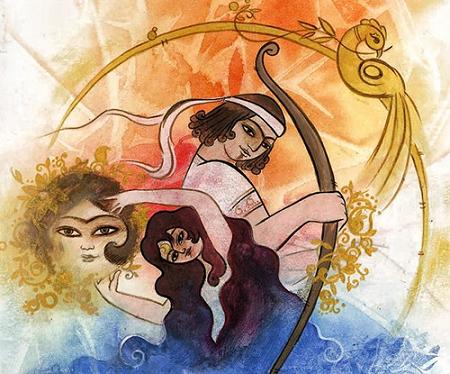Since ancient times, Iranians have annually celebrated various happenings and feasts to honor a person, mark an event and etc.Norouz, Sizdah Bedar, Charshanbeh Souri, Yalda, Mehregan, Sadeh and Tiregan are the seven most important and widely celebrated festival in ancient Iranian tradition and History.Tirgan ceremony (The seventh festival) is the festival of rain ,harvest and counter drought that ancient Iranians hold it ever year in the 13th day of Tir Mah (the fourth Persian month of Iranians) and equates to July 2-3.
Since ancient times, Iranians have annually celebrated various happenings and feasts to honor a person, mark an event and etc.Norouz, Sizdah Bedar, Charshanbeh Souri, Yalda, Mehregan, Sadeh and Tiregan are the seven most important and widely celebrated festival in ancient Iranian tradition and History.Tirgan ceremony (The seventh festival) is the festival of rain ,harvest and counter drought that ancient Iranians hold it ever year in the 13th day of Tir Mah (the fourth Persian month of Iranians) and equates to July 2-3.
There are different legends about the origin of this day. Some Iranians believe that Tishtar, the benevolent divinity of Zoroastrian -in the form of a white horse with golden ears- battled with Apausha, the famine spirit -in the form of a black horse- and gain victory with the help of Ahura Mazda. He brought rain and enhances harvest for his people. while, The others believe that Manouchehr and Afrasiab, the leaders of two Iran and Turan empires that were enemies to each other for a long time, decided to declare peace in this day and determined that "Arash" the best archer of Iran army ascend the mount Damavand, shoot an arrow and the place in which the arrow falls would form the boundary between the two kingdoms (the most common legend). This festival is still celebrated by Iranian Zoroastrian and also some Muslims in different regions of Iran like Arak(Farahan distinct), Isfahan, Kerman, Mazandaran, shiraz, Tehran and Yazd.
In this day people wear their new clothes, play traditional music, sprinkle water on each other, play games called "Moradula" or "Chokadula"or fale koozeh (two ancient games) cook different pastries like Sholeh zard and spinach soup, make a wristband, known as the Tir & Bad with Seven individual strips in different colors, Tie it for ten days and then throw in the wind or stream so that all his/her wishes come true and meanwhile weaving it recite this poem:
"Go away Tir, come wind
Go away grief, come joy
Go away hardships, come abundance
Bring a cluster of pearls for me"
And since is it a religious ceremony for Zoroastrian, they and say prayers, too. This joyful and religious festival is annually held by Iranians in different countries such as Canada, Ottawa.
